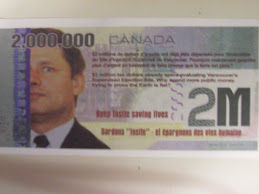A $64-MILLION STRATEGY
National News
Harper takes aim at drug culture
GLORIA GALLOWAY
623 words
5 October 2007
The Globe and Mail
A4
English
2007 CTVglobemedia Publishing Inc. All Rights Reserved.
Canada has become too drug-friendly and it's time for a culture change, Prime Minister Stephen Harper said yesterday as he laid out his government's get-tough strategy for reducing the use of illegal substances.
Police and others fighting the battle against drug abuse are up against a culture that “since the 1960s” has done little to discourage drug abuse and “often romanticized it – romanticized it or made it cool, made it acceptable,” Mr. Harper said.
“As a father I don't say all these things blamelessly. My son is listening to my Beatles records and asking me what all these lyrics mean. It's just there, it's out there. I love these records and I'm not putting them away. But, that said, there has been a culture that has not fought drug use and that's what we're all up against.”
Mr. Harper, flanked by Health Minister Tony Clement and Public Safety Minister Stockwell Day, announced his new two-year, $64-million anti-drug strategy at a Salvation Army building in Winnipeg.
Two-thirds of that money will go to prevention and treatment programs and the rest will be used to beef up enforcement, including the introduction of new mandatory minimum sentences for an unspecified slate of drug crimes.
The Conservatives say they will create an awareness campaign targeted at young people and their parents, fund new treatment services and launch a national youth intervention program to divert young drug users into assessment and treatment programs instead of detention.
On the enforcement side, they plan to direct resources at identifying and closing down grow-ops, pay for more enforcement measures at the border and ramp up the RCMP's Proceeds of Crime Program.
Gone are any musings, such as those of the previous Liberal government, about decriminalization of so-called softer drugs such as marijuana.
Critics have ripped apart the government's strategy on many fronts, especially Mr. Harper's unwillingness to embrace harm-reduction measures such as those offered at Insite, Vancouver's safe-injection site. It allows addicts to safely inject illegal dugs and connect with health professionals who can direct them toward treatment.
The government this week extended funding to that program but only for six months so it can be further studied.
“I remain a skeptic that you can tell people that we won't stop the drug trade, we won't get you off drugs, we won't even send messages to discourage drug use but somehow we will keep you addicted but reduce the harm just the same,” Mr. Harper said of the Insite program. “If you remain a drug addict, I don't care how much harm you reduce, you are going to have a short and miserable life.”
But Thomas Kerr, a professor in the University of British Columbia's Department of Medicine who has studied Insite and its effect on the prevention of the spread of HIV-AIDS, said Mr. Harper is ignoring the facts.
“The government continues to misrepresent the science around harm reduction. In the case of Insite we have shown that there has been a 33-per-cent increase in the rate of entry into detox programs,” Dr. Kerr said. “In no way is the facility perpetuating addiction. In fact, it's helping people quit drug use.”
Leon Mar of the Canadian HIV/AIDS Legal Network said education programs, such as the one proposed by the government, have previously proved ineffective. Health Canada's own review of the Drug Abuse Resistance Education program implemented widely across Canada, he said, has shown that the program does not prevent or delay drug use.
Wednesday, October 17, 2007
A $64-MILLION STRATEGY
Posted by
Jen
at
11:20 AM
![]()
![]()
Subscribe to:
Post Comments (Atom)




No comments:
Post a Comment